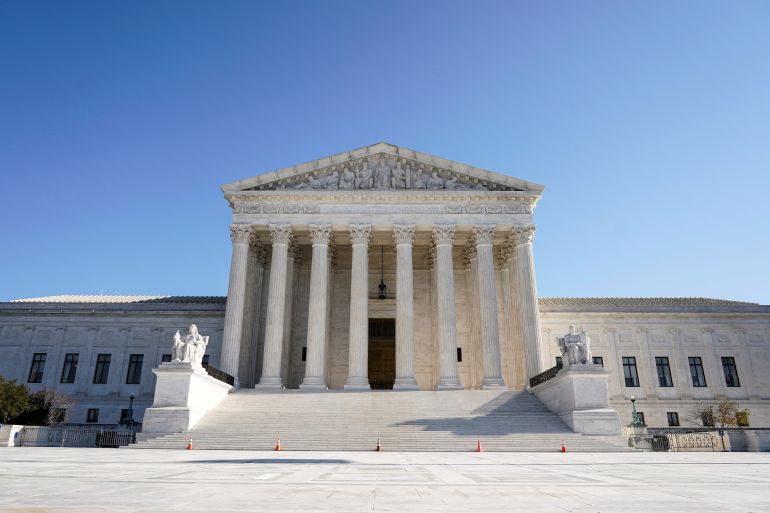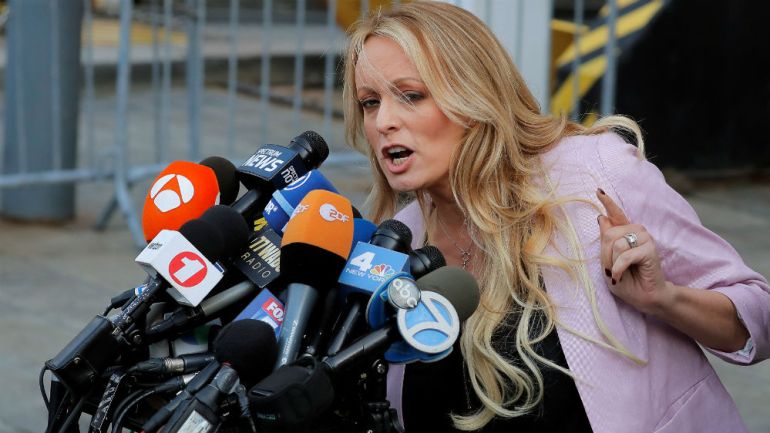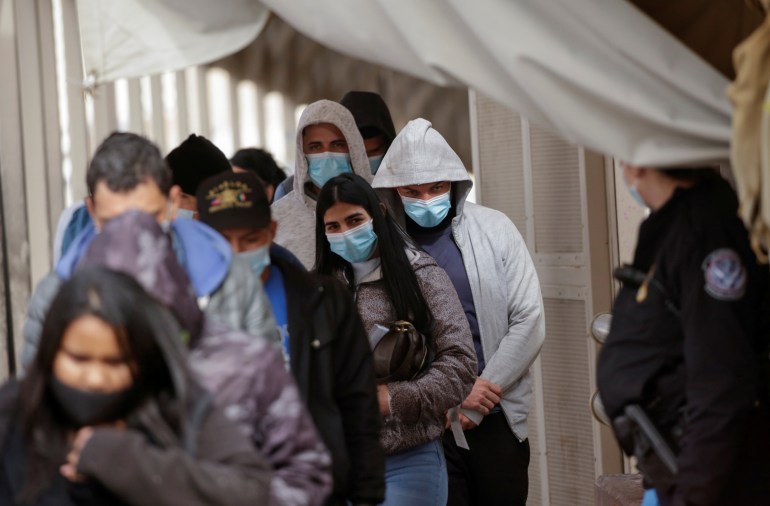US Supreme Court allows prosecutor to obtain Trump tax returns
High court moves on several Trump-era cases, including ending a defamation case against the former president.

The US Supreme Court made a slew of decisions on Monday regarding cases already before the court, many of which involved former President Donald Trump, and what arguments it will hear in the upcoming term.
The cases that the court, which has a 6-3 conservative majority, has decided to dismiss or hear range across the former president’s term.
Keep reading
list of 3 itemsUS immigration agents ordered to focus on serious criminals
US judge suspends South Carolina’s new abortion law
A defamation lawsuit from an alleged former lover, as well as hardline immigration, abortion and electoral challenges, were all before the court on Monday.
Trump tax returns
The court allowed for New York County District Attorney Cyrus Vance to obtain Trump’s tax returns and other financial records as part of a criminal investigation, a blow to the former president’s quest to conceal details of his finances.
The justices without comment rebuffed Trump’s request to put on hold an October 7 lower court ruling directing the former Republican president’s longtime accounting firm, Mazars USA, to comply with a subpoena to turn over the materials to a grand jury convened by Vance.
“The work continues,” Vance said in a statement issued after the court’s action.
Trump slammed the decision saying in a statement released by his office, “The Supreme Court never should have let this ‘fishing expedition’ happen, but they did.”
“I will fight on, just as I have, for the last five years,” Trump continued.
Pennsylvania electoral challenge
The court refused to hear a Republican challenge to a lower court decision that extended the deadline to receive mail-in ballots in the election battleground state of Pennsylvania where President Joe Biden defeated Trump.
The justices turned away appeals by the Republican Party of Pennsylvania and Republican members of the state legislature of the ruling by the state’s top court that ordered officials to count mail-in ballots that were postmarked by Election Day and received up to three days later.
BREAKING: The Supreme Court has denied Trump's Pennsylvania election challenge as moot. pic.twitter.com/6LTvvuMG52
— Kyle Cheney (@kyledcheney) February 22, 2021
Trump repeated unfounded claims about voter fraud costing him the election through January 6, when a far-right mob stormed the US Capitol to stop a joint session of Congress from certifying Biden’s victory. Trump was impeached and acquitted for inciting the riot.
Three conservative justices, Clarence Thomas, Samuel Alito and Neil Gorsuch, dissented from the decision not to review the case.
Biden won the state by more than 80,000 votes. The dispute concerned just 9,428 ballots out of 6.9 million cast in the state. The Supreme Court already had rejected a Republican request to block the lower court ruling.
Daniels
The court rejected adult film actress Stormy Daniels’ bid to revive her defamation lawsuit against Trump over a Twitter post in which he accused her of a “con job” after she described being threatened over publicising her account of a sexual relationship with him.

In bringing the case to a close, the justices left in place lower court decisions throwing out her suit. The San Francisco-based Ninth US Circuit Court of Appeals last year agreed with a Los Angeles-based federal judge who decided in 2018 that Trump’s remarks were not defamatory and were protected by the US Constitution’s First Amendment’s guarantee of free speech.
Defamation cases are difficult to win in the US, due to the First Amendment.
Abortion
The court is set to decide the legality of a government regulation implemented under Trump that bars health clinics from receiving federal family planning funds if they provide abortion referrals.
The justices will hear appeals in cases in which 21 states including Oregon, California and New York, the city of Baltimore and organisations including the American Medical Association and Planned Parenthood challenged the 2019 regulation issued by the Department of Health and Human Services.
Critics have dubbed the Trump regulation a “gag rule” because they maintain that it prevents medical professionals from providing counselling about abortion if a clinic receives family planning funds through Title X of the 1970 Public Health Services Act.
The rule also requires physical separation at any facilities that receive the federal funding and also provide abortions.
“This rule continues to bring immense harm to people across the country who depend on affordable reproductive health care like birth control, breast and cervical cancer screenings, and STI testing and treatment, among other essential health services that Title X provides,” the American Civil Liberties Union, the American Medical Association, Essential Access Health, the National Family Planning & Reproductive Health Association, and Planned Parenthood Federation of America said in a joint statement.
“Tragically, but predictably, this disproportionately impacts Black and Brown patients who are more likely to face the worst health and economic impacts from the COVID-19 pandemic,” the statement continued.
Immigration
The justices also agreed to examine the legality of one of former President Donald Trump’s hardline immigration rules that bars immigrants deemed likely to require government benefits from obtaining legal permanent residency.
Trump’s hardline stance towards all immigration was a hallmark of his presidency. The litigation, filed in federal courts in New York and Illinois, examines which immigrants would be eligible for legal permanent residency, known as a “green card”. US immigration law has long required officials to exclude people likely to become a “public charge” from permanent residency.

The court will review an appeal the Trump administration had filed of a lower court ruling that found the rule likely violated federal immigration and administrative law by impermissibly expanding the definition of who counts as a “public charge” and greatly increasing the number of people who would be rejected for residency.
Biden has promised a sharp reversal of Trump’s policies. The president has already pushed for immigration reform, including a pathway to citizenship for 11 million undocumented people.